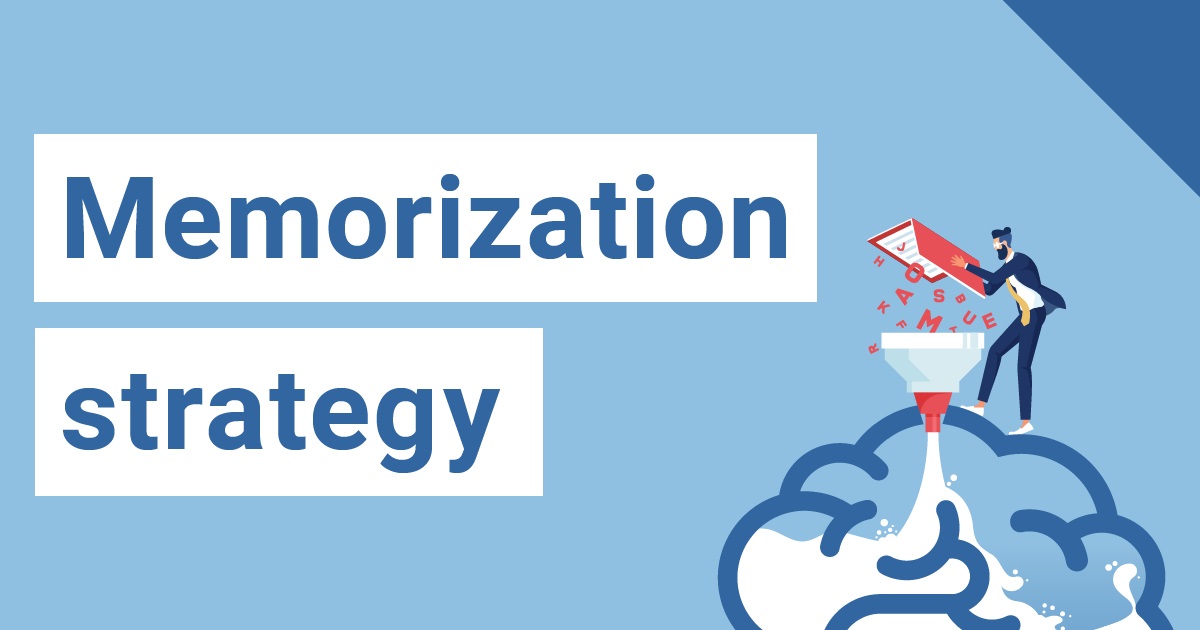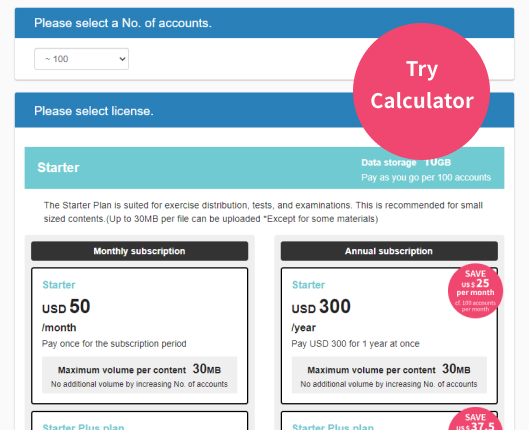Memorization strategy

Memorization is an important element in the learning process especially in schools and organizations. However, many people may be frustrated when cramming information.
For an effective memorization process, following appropriate methods are the keys to success. In this article, we will elaborate on the eight strategies for memorizing and point out essential tips when embracing.
Contents
Memorization Process

When you memorize materials, you may try to understand the information first. Or, some of you may just focus on keywords without understanding. Both of the methods have benefits, and by utilizing these two types of process properly depending on the objects, positive impacts will be made on the results.
We will elaborate on each strategy, focusing on the situation that you should embrace one of the methods.
Cramming
Some people may think cramming is always ineffective. However, when it comes to words and symbols such as chemical symbols or words of a foreign language, you do not have to understand the nature of each item deeply at the first view. If you try to acquire a deep knowledge and understanding about each item, it will be difficult to make it during the preparation time for an exam.
Even though the target word is unfamiliar to you, try to memorize it without understanding as the first step so that you can understand with some more specific information afterwards. For instance, you can categorize some words or put information together related to the words. Higher-level information requires much time to understand, and it will be a shortcut to cram it first even if you cannot explain it specifically.
Understanding
In contrast to the above method, there are some cases where you can maximize the effectiveness of memorization with understanding as the first step. In math class, formulas and solution patterns may be good examples. Since math requires logical thinking, the key in this sector is the process to solve problems, in other words, understanding is more important than memorization.
What will happen when you memorize math formulas but do not understand it? Without understanding, you may be stuck at a certain point since you do not understand how and when to use the formulas. As mentioned above, logical thinking is required for math. As for logical studies including math, memorized information is worthless especially for advanced levels.
Understanding rules also plays an important role. For example, you may find some regularity in chemical equations or grammar. When you try to memorize a great number of materials, these regularities will help you clarify the categories without cramming.
Back to Contents8 Memorization Techniques

Memorization skills can be enhanced with ingenuity. Following the memorization techniques, information will be stored more effectively in your brain.
We will dive into the 8 techniques in the following paragraphs. Discover some useful tips for your memorization according to your objectives.
Talk to Yourself
Speaking aloud stimulates your brain more than just following the text with your eyes or highlighting sentences. When you speak aloud, you need to be aware of what you are saying in addition to the sound effects from your ears, which helps you memorize information more effectively.
When it is difficult to speak aloud in a quiet place like a library, try to mumble so that you can take advantage of the technique.
Write it out
Writing is an effective method to connect visual information to the brain. This method allows you to make things clear in the brain and to find areas where your memory is fuzzy or misunderstood. Furthermore, it helps you measure how much you understand the section.
When it comes to visual impressions, it also helps to leave an impression in the brain by writing in different colors for the parts that are difficult to memorize. To improve memory, do not focus just on writing but on the content itself.
Repetitive Learning
The more frequent you access information, the less likely you are to forget it. From this point of view, repetitive learning is one of the effective methods to amplify the memory skills. Even though long-term memory does not last forever, continuous review is required for more stabilized memory.
For repetitive learning, flashcards and checklists are well known as effective tools.
Schematization
Diagrams and illustrations will be a big help when you struggle with complex information. Schematization fosters deeper understanding, catering to grasp the specific process as a whole. For example, you may have experienced that it is much easier to understand history with comic books than just following text in the textbook. Such visual effects will help not only to understand the content but also remain as semantic memory in the brain.
Regarding math problems, graphs and charts will improve understanding. These methods help you to solve the problems, increasing memory recall ability.
Physical Movement
Improving blood flow activates the brain, which makes it easier to retain memories. Since sitting at a desk for a long time reduces blood flow, moderate exercise is recommended to maximize the performance.
Using actions will also enhance your memory. When you cannot concentrate on memorizing, physical exercise can make a positive impact on your mind. When memorizing materials, be sure not to focus on exercise itself so that you can drive results effectively.
Before going to sleep
Information in the brain is organized and consolidated during sleep. To take advantage of this factor, it is effective to study before you go to bed so that you can retain and recall information efficiently.
However, blue light emitted from smartphones or computers interferes with good sleep, and paper-based materials such as flashcards or textbooks may work better.
Chaining
This method makes it easier to recall memory when you try to remember it. A semantic relationship between words effectively works to retain information in the brain, and a specific keyword can be a trigger to remember the corresponding word.
Also, actions with rhythm can be linked to a word. For instance, it will be easier to memorize historical years or elementary symbols moving your body with rhythm. The more impression you make toward the target item, the easier it will be to remember it. Furthermore, such memories tend to last longer.
Share What You’ve Learned
Memory retention will be enhanced by outputting information. At the same time, logical expressions are required when describing the content so that the audience can understand it. This allows you to figure out where you do not understand nor remember well. Once you find your strength and weakness, the next step is simply focusing on your weakness.
In this way, output plays a crucial role not only to retain memory in your brain, but also clarify both strong and weak areas. Even having opportunities to explain the target section will remain as one of the impressive experiences in the brain.
Back to ContentsIneffective Methods

Needless to say, memory will not be retained with ineffective memorization strategies. In order to make the information last longer, you should avoid some methods.
In the following section, two methods are mentioned as ineffective strategies.
Spending much time on one subject
When you spend much time on one subject, it tends to be difficult to organize information in the brain as a lot of similar elements are included, which results in less memory consolidation.
Also, if you keep studying one subject, you may easily get bored and lose focus.
To prevent the inefficiency, time you study should be divided into some groups, selecting different subjects for each. When you focus on one subject, the time group should be divided based on each section or category so that the information can be well-organized in the brain.
Studying overnight
Good sleep enhances memory. In other words, studying overnight does not effectively work when it comes to memorization strategy. Continuous studying on a daily basis plays an important role to avoid studying overnight.
Furthermore, what you crammed before the test day will not last as a long-term memory in most cases. You may have experienced that you could not recall the information memorized in that way after some time has passed. The day before the test, it is important to finish up your study focusing on a specific area, and go to bed early.
Back to ContentsImprove Memory

In addition to good sleep, repetitive learning is also a crucial factor. The more you see or learn the same item, the more your memory stays longer and well-organized in the brain. Even if you cannot work on studying for hours a day, there are some helpful tips for success.
Let us dive into the following three tips.
Maximize Sleep
Sleep is an essential element for memory retention. In other words, lack of sleep reduces brain performance. Even though you try to memorize a large number of materials and study for a long time, high study efficiency will not be expected. Such method results in less memory retention and has bad effects on performance.
Remember to get enough sleep without staying up late.
Utilize Spare Time
Even though you are busy and have little time to study at a desk, you can improve memory by utilizing spare time. This method will contribute to repetitive learning since the repeated memory tends to last longer in the brain. In comparison, unused memory is easily forgotten as well as difficult to remember.
Taking the most of its features, frequent review is the key to success especially for a busy person. While commuting, waiting for someone, taking a bath etc., utilize your spare time to maximize your performance.
Avoid Short-Time Cramming
While it helps to memorize a large amount of material in order to bring results, cramming during a short period of time will not work effectively. For example, when you try to memorize all words in a dictionary of a second language in one week, what happens? You will find many of them cannot be remembered. This kind of experience can be a trigger to lose your motivation, and the time you spent may go in vain.
Thus, information should be memorized gradually and steadily. Set the mid- to long-term plan including frequent reviews will bring results for your success.
Back to ContentsSummary
As mentioned above, there are several ways for effective memory strategy. Depending on the subject or section you work on, select the best way to boost your memory.
Also, we discussed that frequent review and good sleep are the keys to success to keep memory in the brain. Well-planned study schedule is also important, avoiding a short-time cramming. Even if you have a lot of information to memorize, proceeding in a systematic manner will bring results.
An award-winning LMS (learning management system), learningBOX, offers a variety of functions including flashcards and quizzes. In addition to score management, it has features to enhance repetitive learning so that learners can acquire knowledge effectively. learningBOX has a forever Free Plan and you can try it to see how it works.
▼You may also like:
Back to Contents Back to Article List


















